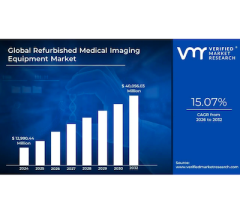
Getty Images
December 6, 2023 — The American Medical Association (AMA) released new principles for augmented intelligence (AI) development, deployment, and use – a critical step toward fostering a consistent governance structure for advancements in health care technology. Building upon current policy on AI, the principles serve as the cornerstone for AMA advocacy on AI and underscore the organization's commitment to supporting the implementation of national governance policies that prioritize the development and deployment of AI in a manner that is ethical, equitable, responsible, and transparent.
“The AMA recognizes the immense potential of health care AI in enhancing diagnostic accuracy, treatment outcomes, and patient care,” said AMA President Jesse M. Ehrenfeld, M.D., M.P.H. “However, this transformative power comes with ethical considerations and potential risks that demand a proactive and principled approach to the oversight and governance of health care AI. The new AMA principles will guide the organization’s engagement with the administration, Congress and industry stakeholders in discussions on the future of governance policies to regulate the development, deployment and use of health care AI.”
The key principles laid out by the AMA call for comprehensive policies that mitigate risks to patients and physicians, ensuring that the benefits of AI in health care are maximized while potential harms are minimized. Key concepts outlined by the AMA principles include:
Oversight: The AMA encourages a whole of government approach to implement governance policies to mitigate risks associated with health care AI, but also acknowledges that non-government entities have a role in appropriate oversight and governance of health care AI.
Transparency: The AMA emphasizes that transparency is essential for the use of AI in health care to establish trust among patients and physicians. Key characteristics and information regarding the design, development, and deployment processes should be mandated by law where possible, including potential sources of inequity in problem formulation, inputs, and implementation.
Disclosure and Documentation: The AMA calls for appropriate disclosure and documentation when AI directly impacts patient care, access to care, medical decision making, communications, or the medical record.
Generative AI: To manage risk, the AMA calls on health care organizations to develop and adopt appropriate polices that anticipate and minimize negative impacts associated with generative AI. Governance policies should be in place prior to its adoption and use.
Privacy and Security: Built upon the AMA’s Privacy Principles, the AMA prioritizes robust measures to protect patient privacy and data security. AI developers have a responsibility to design their systems from the ground up with privacy in mind. Developers and health care organizations must implement safeguards to instill confidence in patients that personal information is handled responsibly. Strengthening AI systems against cybersecurity threats is crucial to their reliability, resiliency, and safety.
Bias Mitigation: To promote equitable health care outcomes, the AMA advocates for the proactive identification and mitigation of bias in AI algorithms to promote a health care system that is fair, inclusive, and free from discrimination.
Liability: The AMA will continue to advocate to ensure that physician liability for the use of AI-enabled technologies is limited and adheres to current legal approaches to medical liability.
In addition the AMA principles address when payors use AI and algorithm-based decision-making to determine coverage limits, make claim determinations, and engage in benefit design. The AMA urges that payors’ use of automated decision-making systems do not reduce access to needed care, nor systematically withhold care from specific groups. Steps should be taken to ensure that these systems are not overriding clinical judgement and do not eliminate human review of individual circumstances. There should be stronger regulatory oversight, transparency, and audits when payors use these systems for coverage, claim determinations, and benefit design.
As the health care landscape evolves, the AMA is committed to prioritizing a regulatory framework that ensures only safe, high-quality, unbiased, and clinically validated AI products are brought to market. By setting forth these principles, the AMA aims to guide the responsible development and deployment of augmented intelligence, ensuring that these technologies contribute positively to the future of health care.
For more information: https://www.ama-assn.org/


 February 06, 2026
February 06, 2026 









